|
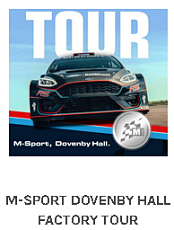
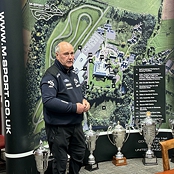
Roger explains test track
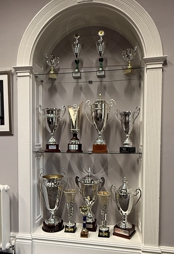
part of the trophy cabinet
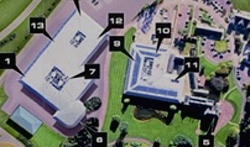
Site map
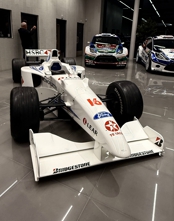
Race car out of place?
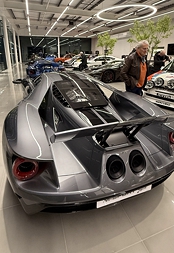
Big GT40 power unit
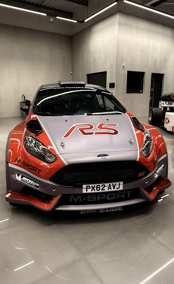
Ideal shopping car perhaps
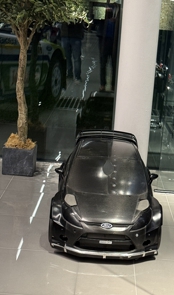
A pedal car for young driver
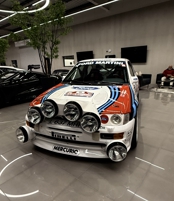
All lights see in the dark
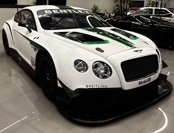
Remember Bentley GT3
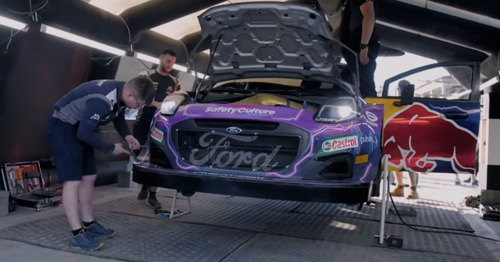
Puma service on stage
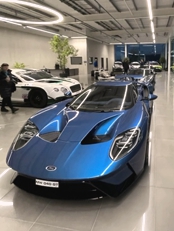
Ford GT40 stick shift
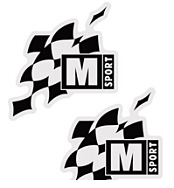
|
|
|
 |
CCHMSC visit M-Sport - Thursday 23 October 2025
Report & photos by Jim Paterson
Some of our club members gather in the Trophy Room at Dovenby Hall
After
a sunny drive down from Edinburgh our group of eleven members met at
Dovenby Hall in Cockermouth for our visit to the M-Sport facility and
tour of the various workshops. A second smaller group joined our tour
making just over 20 of us. Our tour leader Roger Fisher met us in the
Trophy Room where light refreshments were available.
After Roger’s pre tour talk we headed out to the first workshop,
the gearbox and differential build workshop. These units are built by
the french engineering specialist Sarev, to the M-Sport specification,
e.g. gear ratios etc. Units for 2WD and 4WD are used in new vehicle
builds, and rebuilt on cars returning from events. Roger pointed out
that the extra input shaft that used to accept drive from the hybrid
electric motor is now blanked off. This follows the FIA regulation
change to remove hybrid working for the current rally car season. ED
– Loud cheer from the petrol heads! Whilst the Ford
Puma is the current rally car M-Sport work with, they still rebuild
Fiesta’s running in competitions.
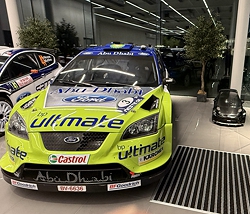
Meet my younger self....
|
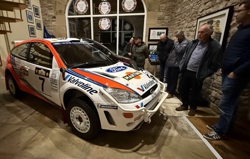
McRae African Focus
|
Flying Puma's flat out
Moving
on to the engine preparation workshop we saw the Ford 1600 unit that
forms the basis of the rally car power unit in various stages as it is
upgraded to rally spec in house. Adjacent to the workshop is the
dynamometer room where completed engines are run up to speed to measure
measure force, torque or power. Ear plugs are the order of the day when
in operation! Alongside the Ford 1600cc units were a couple of 5.3
litre V8‘s. These are used in the latest Ford Raptor T1 cars
which compete in the Dakar, the current iteration of the Paris Dakar
rally that we veterans remember.
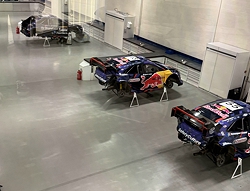
Puma preparation
|
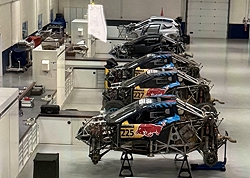
Raptors in preparation
Escort and Focus in the distance
|
Onwards to the car preparation area, where several Puma's, Fiesta's,
and Raptor T1‘s were being built / rebuilt for customers. M-Sport
no longer build the Bentley GT3 cars.
Apart from the Fiesta cars the others were built round a space frame
system, rather than the strengthened chassis with roll cage
fitted. For space frame think of an extended roll cage with
engine compartment upfront and the boot area at rear holding the
suspension, engine and ancillaries. The vehicle bodywork is then
attached as panels, usually in aluminum or carbon fibre, to the
frame. We noticed that there was not a hydraulic lift on
site, all the cars raised on chassis stands some two feet high. Roger
explained that on stage you don't have the luxury of lifts, and as the
technicians (they don't call them engineers) who work on the M-Sport
WRC cars in this workshop get first refusal to travel to events with
the car, they would only have stands in service areas on stage, so will
be used to working under long leg stands.
A walk to the chassis build workshop we saw space
frames in various states of construction. It takes some 80 metres of
tubing to make a Pumas frame, and 100 metres for a Raptor. Each frame
is checked on a jig to ensure it is true and not deformed in any way,
and all welds scanned for integrity. The same operation is carried out
after a car is returned from and event. A close look at a Raptor, just
back from Morocco still had signs of Sahara desert sand on the exhaust
pipe, despite having been cleaned before leaving Morocco and again at
arrival in the UK. The V8 engine is at the front but the radiator
engine cooling and associated fans (all four of them) were at the rear.
The underside is fully protected by heavy steel guards, e.g. sump,
transmission etc.
As
the evening was now dark we had quick view of the track before heading
to the showroom. Here we could see a wide selection of rally, race,
supercars and a few street cars.
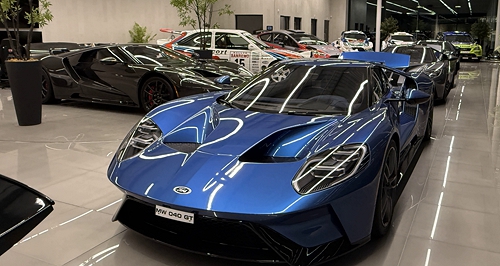
GT40 leads the showroom collection
Roger
pointed out a 1976 Ford Escort MK2 in that wonderful bronze shade,
officially known as Roman Bronze. Turned out this particular one was
built for the personal use of Henry Ford II, who spent a lot of time in
the UK.
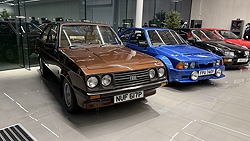
Henry Ford II Escort Mk2 RS2000
|
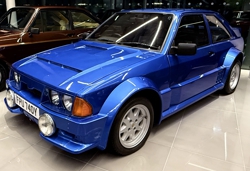
Escort Mk3 that never was
|
Henry
Ford tasked Walter Hayes, then President of Ford of Europe, to provide
a day car as his runabout while here. The result was this RS2000 in
Roman Bronze, de-badged to keep it under the radar and fitted with an
automatic gearbox because Ford preferred it. The interior was finished
with leather seats and deep-pile carpets. Next to the MK2 Escort was a
prototype Mk3 variant which looked stunning but never saw the light of
day, as competition rules advanced to 4WD making the design redundant,
Ford changing focus to the Fiesta.
We completed our tour passing Colin Mcrae's winning Focus, used on the
African rally. However it was so heavy, with added protection etc, that
it had a limited competitive lifetime.
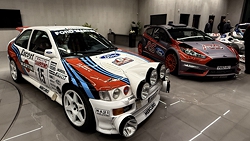
any space for another sticker?
|
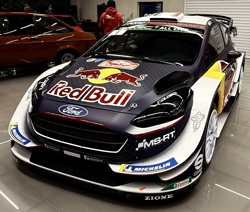
in red bull livery
|
A short visit to the 16th century part of Dovenby Hall, still with the
original wall paneling, completed our tour. The three years since
our last visit has seen much change in the vehicles used in rallying
today. I wonder what the next three years will bring to the competitive
scene. One thing we can count on, M-Sport will be at the leading edge
of designing, delivering and maintaining class winning competitive
cars.
Flying Puma's flat out
As we headed to our final spot we passed the boxes of kit (spares,
tools, oils etc) that go out to each venue before the rally event. For
distant venues this all goes by ship, so set off months ahead of the
event. For closer venues they go by air. Remember the technicians
that built the car here at M-Sport usually fly out to service it on the
event.
|
|
Published 27 October 2025
Webmaster
|
|